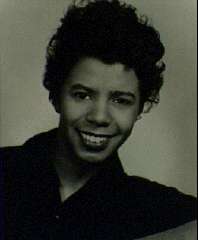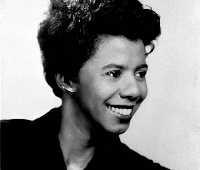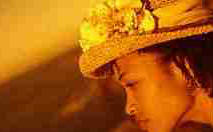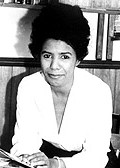








































 
A Raisin in the Sun
To Be Young, Gifted, and Black: Lorraine Hansberry in Her Own Words
The Importance of Lorraine Hansberry
The Les Blancs: The Collected Last Plays
|
Lorraine Hansberry (1930-1965)
Playwright --
"A Raisin In The Sun"

“Race--racism--is a device. No more. No
less. It explains nothing at all. . . . I am simply saying that
a device is a device, but that it also has consequences: once
invented it takes on a life, a reality of its own. So in one
century, men invoke the device of religion to cloak their
conquests. In another, race. Now, in both cases you and I may
recognize the fraudulence of the device, but the fact remains
that a man who has a sword run through him because he refused to
become a Moslem or a Christian--or who is shot in Zatembe or
Mississippi because he is black--is suffering the utter reality
of the device. And it is pointless to pretend that it doesn't
exist--merely because it is a lie!” -- Lorraine Hansberry
“I was born black and female,”
playwright Lorraine Hansberry wrote, summing up the influences
on her life and work. If she had lived longer, she might have
added “and lesbian” to her description of herself.
Lorraine Hansberry was born in 1930 the youngest of four
children of Carl and Nannie Hansberry, a respected and
successful black family in Chicago, Illinois. Nannie was the
college-educated daughter of an African Methodist Episcopal
minister, and Carl was a successful real estate businessman, an
inventor and a politician who ran for Congress in 1940. Both
parents were activists challenging discriminating Jim Crow laws.
Because of their stature in the black community such important
black leaders as Paul Robeson, W.E.B. DuBois, and Langston
Hughes frequented the Hansberry home as Lorraine was growing up.
Lorraine didn’t attend private schools while she was growing up,
even though her family could afford it. She was educated in the
segregated public schools as her family worked within the system
to change the laws governing segregation. When she was eight,
her parents bought a house in a white neighborhood and the
discrimination there led to an antisegregation case before the
Illinois Supreme Court, which her father won. This was the
situation upon which “A Raisin in the Sun” was loosely
based.
Hansberry went to the University of Wisconsin for a few years,
then headed to New York to write for radical newspaper Freedom,
furthering her involvement in the civil rights movement.
In New York she became disillusioned by the limited roles for
black actors and at 29, this motivated her to write “A Raisin In
The Sun.” The play took its title from a line in a Langston
Hughes's poem.
 Hansberry
met and married a white Jewish intellectual named Robert
Nemiroff in 1953. The marriage lasted only a few years, and
afterwards, though it wasn't revealed until after her death,
Hansberry began exploring her feelings for women. Around 1957,
Hansberry joined the Daughters of Bilitis, the pioneering
lesbian organization based in San Francisco, and began receiving
their journal, The Ladder. Hansberry
met and married a white Jewish intellectual named Robert
Nemiroff in 1953. The marriage lasted only a few years, and
afterwards, though it wasn't revealed until after her death,
Hansberry began exploring her feelings for women. Around 1957,
Hansberry joined the Daughters of Bilitis, the pioneering
lesbian organization based in San Francisco, and began receiving
their journal, The Ladder.
Two lengthy letters were published in The Ladder in May and
August of 1957 under the initials L.H.N. and L.N., respectively.
Both are believed to be written by Hansberry. The letters
applauded the growing West Coast homophile movement and mused on
butch-femme culture and the gaps between lesbians and gay men.
The August letter asserted, "Homosexual persecution has at its
roots not only social ignorance, but a philosophically active
anti-feminist dogma."
It was with A Raisin in the Sun that Hansberry left her mark.
When the play debuted on Broadway in 1959, she became an instant
celebrity. Not only was she the first black woman writer to have
a play produced on Broadway, she was also the first black
person--and only the fifth woman--to win the New York Drama
Critics Circle award. The play became a huge hit and was made
into a movie starring Sydney Poitier two years later.
It was not widely known but Lorraine and Nemiroff actually were
divorced in 1964 before her death. At that time Lorraine had
begun to come out as a lesbian. Among her reasons, to be sure,
was the fear of reprisals in her career. After all, in 1965 the
Gay Liberation Movement did not exist and a woman could not
claim such an identity without major impacts. It was not until
the 1980s that feminist scholars began connecting her feminist
vision with her lesbian identity.
Lorraine also published an array of articles, poems and prose.
In addition to her association with the theatre, she was also an
activist for the black and gay rights movement. She wrote about
race and gender issues in her works defining political issues.
Her inspirational writings had an impact on people around the
world.
Sadly, Hansberry's contributions to theater, to African-American
culture, and to gay liberation were all cut short. After a bout
with ulcers, she learned in July 1964 that there were serious
problems with her intestinal system. Six months later she died
of cancer at the age of 34. Nemiroff, her ex-husband and
literary executor, spent the next 25 years keeping her work
alive. But Hansberry's sexual identity remained hidden until
lesbian scholars brought it to light in the 1980s.

Source: Gay.com
and PlanetOut
|
|

|

Lorraine Hansberry: The Black Experience in
the Creation of Drama
This film shows the playwright's artistic growth and her unique
artistic vision largely in her own words and her own voice. With
excerpts from The Sign in Sidney Brustein's Window, Les Blancs,
and Raisin in the Sun with Sidney Poitier, Ruby Dee, Diana Sands
and Roy Scheider.
Supplier: Weysmere Media
Product ID: #EDU35776 VHS, Color, 35 min
|
|
Lorraine Hansberry Audio Collection
Lorraine Hansberry; Playwright and Voice of Justice
|
|

|